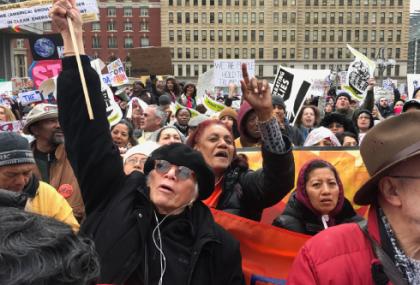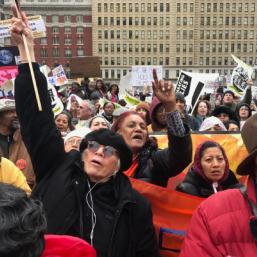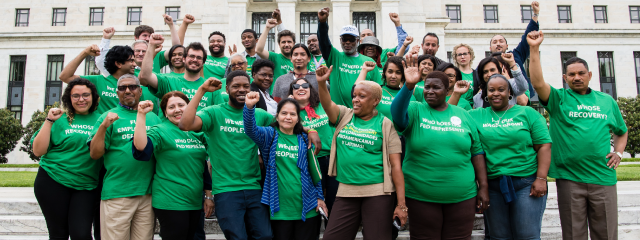Blog


On November 13 Fair Workweek Initiative Director Carrie Gleason joined Darrion Sjoquist, a Starbucks Barista and member of Working Washington, and Charlie Dewitt from scheduling technology company Kronos, on a panel about the issue of workforce scheduling at “Next:Economy” A summit of leading business and technology thinkers.
During the panel, Darrion spoke about Starbucks’ persistent understaffing, the resulting last-minute scheduling changes and the barriers he and other Starbucks workers face taking sick leave, and the impact of these policies on him and his co-workers. Charlie spoke about Kronos’ new scheduling equity software, developed in consultation with the Fair Workweek Initiative and our academic partner Susan Lambert, that gives employers the tools to help them track their scheduling practices, measure core scheduling metrics, but also demonstrate how sustainable schedules influence staffing retention and company profitability. Carrie went on to unveil the High Road Workweek Partnership, a new, groundbreaking approach to incorporate employee voice and scheduling equity values into technology and management practices.
The High Road Workweek Partnership responds to a recognition by many industry leaders that they can no longer defend scheduling practices that ignore their employees’ obligations outside of work and their need for stable incomes.
Many employers are realizing that predictable, stable and flexible work schedules are not just good for employees, but are essential to meeting operational, sales and growth objectives. A new paradigm is needed to create schedules that are balanced and equitable. Scheduling technologies can be a part of the solution, but a company’s values, policies and practices, as well as real input from employees, will ultimately determine how effectively a company transitions to the next generation of work schedules.
The Center for Popular Democracy’s High Road Workweek will use three key components to help employers develop and maintain a new approach to scheduling:
- A Partnership of Core Stakeholders: through stakeholder engagement, employers assess the impact of their current scheduling practices and envision a sustainable workweek;
- The High Road Workweek Pledge: a commitment to scheduling practices that promote Predictability and Stability, Adequate Hours, Employee Input and Flexibility, and Equal Opportunity and Mobility; and
- Measurable Implementation and Assessment: innovative technologies, clear metrics and guidance for managers, paired with ongoing employee feedback and a research-based evaluation.
The High Road Workweek Partnership is currently seeking employers to participate in the initial pilot project. We are confident that the partnership will deliver lasting scheduling solutions and provide a framework for employers to achieve sustainable work schedules that evolve with the changing business landscape and the dynamic needs of their employees.


Threatened by devastating droughts, superstorm hurricanes, and the increasing severity of climate change, CPD, partner organizations, and allies throughout the country took action in October to demand bold, decisive measures to address the climate crisis.
Continuing the work of last year’s historic People’s Climate March in New York City, the People’s Climate Movement National Day of Action on October 14 advanced demands that world leaders and US representatives secure strong, binding agreements to drastically reduce carbon emissions at the critical international climate negotiations occurring in Paris this December.
With nearly 200 actions in 47 states, the day of action mobilized communities throughout the country. Importantly, many of these actions were driven by the low-income communities and communities of color that are disproportionately impacted by the climate crisis.
CPD partner organizations played a key role in this mobilization with Action North Carolina, ACTION United in Philadelphia and Pittsburgh, CASA de Maryland, Community Labor United in Boston, Make the Road New York, New York Communities for Change, Neighborhoods Organizing for Change in Minneapolis, New Florida Majority in Miami, Ohio Organizing Collaborative in Cleveland, One Pittsburgh, Organize Now in Orlando, and Rights & Democracy in Vermont driving or participating in actions.
The actions included the targeting of JPMorgan Chase in New York for fossil fuel financing, the launch of a cutting edge green jobs initiative in Philadelphia, and the largest action in the country – 2,000 people marching in the streets of Miami – organized by New Florida Majority and a vibrant coalition of local allies.
With this new momentum, CPD, with our partners and allies are helping to grow the critical organizing infrastructure to address the climate crisis over the long term.


In early October, the Center for Popular Democracy brought together 20 partners and allies from across the country to start a conversation about our Get Free!: Justice and Opportunity Initiative. Organizers and community leaders from Milwaukee, Chicago, Atlanta, Baltimore, St. Louis, Miami, Cleveland, Orlando, Detroit, Los Angeles, Texas and New York came together to discuss how we can work together to attack the root causes of systemic poverty, violence, and racism by examining the priorities set by city and state budgets throughout the country.
During the one-day convening we shared research and ideas about how to create an affirmative vision coupled with a concrete plan for reallocating state funds to invest in quality jobs, education, and community-based justice programs in the communities (especially, but not exclusively, Black and Latino communities) that have systematically been stripped of resources and wealth.
Many local, state and national investments in criminalization are fundamentally misguided and come at the expense of the overall health of communities. This is symptomatic of a failing and flawed system. A focus on local policies and budgets in cities that face severe crises of opportunity and are most impacted by mass criminalization, policing, and incarceration provides an opportunity to elevate innovative and effective policy and organizing solutions and build momentum for national change.
The Center for Popular Democracy has been conducting research on local municipal budgets and working with partners and allies to develop policy and budget proposals that better align our budgets with our core values of racial justice and opportunity. We are looking forward to continuing to work with state and local organizations to support campaigns that push states and municipalities to rethink their investment priorities and policies.


Over 238,600 workers now free from on-call scheduling
As of this month, 238,600 retail workers are now free from on-call scheduling— an employer practice that forces working people to put their lives on hold without guarantee of work or compensation for their time.
Urban Outfitters joined five other brands in ending on-call scheduling in U.S. stores, including the Gap Inc., Bath & Body Works, Abercrombie & Fitch, Victoria’s Secret, and J. Crew.
New York Attorney General Eric Schneiderman’s probe into on-call scheduling practices at 13 retailers, coupled with broader public pressure, has helped turn the tide on this troubling practice. Grassroots organizations across the country are continuing to push for new public policies to ensure that workers are not subject to other forms of last-minute, unpredictable schedules, and to ensure that all workers are paid for their time when they are required to be available to work.
Baristas win advanced notice and end to clopens at Starbucks
Thank you to all those who signed Ciara's petition organized by our partner CPD Action, asking for 11 hours of rest between shifts at Starbucks. Since her petition launched, workers have taken action in their stores and at corporate headquarters.
As a result, Starbucks has announced a significant change in its policy. All workers will now get at least 2 weeks’ notice of work schedules instead of 10 days, their scheduling software will no longer schedule workers to close and then open stores the next day - "clopens" - and store managers can no longer override the system. Workers will also get a minimum of 8 hours of rest between shifts. This means that workers are one step closer to getting the rest they need to work productively as well as being with and looking after their loved ones. If you haven't already read our report on the state of scheduling at Starbucks, it can be downloaded here: The Grind: Striving for Scheduling Fairness at Starbucks.
Now, Starbucks workers from Seattle to Atlanta are calling for a meeting with CEO Howard Schultz to find more comprehensive solutions to these scheduling issues. You can add your name to show your support for baristas having fair schedules and a voice at work here.


On October 29th, Shena Elrington, CPD’s Director of Immigrant Rights & Racial Justice Policy, participated in a BRIC TV town hall meeting, Breaking Down the Walls: Brooklyn #BHeard on Immigration. Along with fellow panelists and advocates, including NYC Councilmember Carlos Menchaca, Linda Sarsour of the Arab American Association, NYU Law Professor Alina Das, and BuzzFeed immigration reporter Adrian Carrasquillo, Shena discussed some of the most pressing challenges and opportunities facing immigrants in New York and beyond. During the discussion, panelists debunked pervasive myths about immigrants, commented on the future of comprehensive immigration reform, advocated for innovative strategies for building inclusive communities locally, and issued a call to action for broad-based engagement of diverse immigrant communities and communities of color moving forward. To see the full video of the event, click here.


On September 30, Senator Elizabeth Warren joined grassroots community leaders and 15 mayors and city councilmembers in Washington, DC to call on the US Department of Housing and Urban Development (HUD), Fannie Mae, and Freddie Mac to stop selling off tens of thousands of delinquent mortgages to Wall Street speculators, and, instead, to sell them to purchasers that have a program and plan to save homes from foreclosure and create affordable housing. CPD partners New York Communities for Change (NYCC) and the Alliance of Californians for Community Empowerment (ACCE) led the effort to organize the event, along with Local Progress, New Jersey Communities United, and the Right to the City Alliance to organize the event.
Immediately following this meeting, a smaller delegation of local elected officials together with community leaders from around the country met with Federal Housing Finance Agency (FHFA) Director Mel Watt and Federal Housing Administration (FHA) Commissioner Ed Golding.


In early October, over 40 organizers, member leaders, and staff from 18 partner organizations participated in an intensive two-day New Organizers Training program, held at CPD’s Brooklyn office.
The training focused on building basic organizing skills and included topics such as: membership recruitment, building relationships through one-to-ones, leadership development, understanding power, campaign strategy, and creative direct action. During the program, participants went out to knock on doors in Bushwick with Make the Road New York to talk to residents about building power and about protecting New Yorkers living in rent controlled apartments.
During the program, we were delighted to be joined by Andrew Boyd from Beautiful Trouble, who worked with participants on the art of building creative direct action. Participants left ready to focus on developing leadership and creating strategic capacity within their member base through their campaigns and programmatic work.
One participant reflected on what they will bring back to their work, writing, “I am going to focus on building deep, strong relationships with members based on a common political bond; I am going to be more intentional about creating roles for members that move them towards leadership; and I am going to work with members to implement "norms" for our decision making processes.”


The Berks County Residential Center in Pennsylvania is one of only three family detention centers in the country (the other two are in Texas). Immigration advocates have said that the Berks County Residential Center operates illegally and that families who enter the country seeking asylum should not be detained.
The center has come under scrutiny through the debate over how the federal government should respond to the influx of refugees fleeing violence in Central and South America. Members of Make the Road Pennsylvania have been protesting the facility and on October 22 the Pennsylvania Department of Human Services issued a press statement stating that they believe that the Berks County Residential Center as a family residential center is inconsistent with its current license as a child residential facility.
The Department has not yet taken any final action, but they are holding off on a request to expand the capacity of the facility from 96 residents to 192 residents until Berks County Residential Center is in compliance.
This is a major step towards closing down this detention center once and for all.


Over 100 progressive elected officials from around the country gathered in Los Angeles this week for Local Progress’ Fourth Annual National Convening to celebrate their victories, share best practices, and build solidarity for the fights ahead. It was a major moment of growth for the network, which was started in 2012 and is staffed out of the Center for Popular Democracy.
As our leading members argued in a set of articles recently published in The Nation, cities are the great hope of the progressive movement. With most federal and state government controlled by conservatives, it is cities that are leading the way forward to a more equitable, just, and sustainable future.
The convening was a tremendous success, and we are incredibly grateful to Local Progress members and supporters for their commitment to this work. Together, we are building lasting progressive infrastructure that can advance a genuine social justice agenda for years and decades to come.


Today, Senator Elizabeth Warren joined grassroots community leaders and 15 Mayors and City Councilmembers in DC. to call on HUD, Fannie Mae and Freddie Mac to stop selling off tens of thousands of delinquent mortgages to Wall Street speculators, and, instead, to sell them to purchasers that have a program and plan to save homes from foreclosure and create affordable housing. CPD Partners New York Communities for Change (NYCC) and the Alliance of Californians for Community Empowerment (ACCE) joined Local Progress, the Center for Popular Democracy, and the Right to the City Alliance to organize the event.
Immediately following this meeting, a smaller delegation of the local elected officials and community leaders are scheduled to meet with FHFA Director Mel Watt and FHA Commissioner Ed Golding.
On October 26-28th elected officials from across the country will come together in Los Angeles for the Fourth Annual Local Progress Convening for three days of movement-building, policy innovation and solidarity. The program will include presentations by the nation’s leading experts on a wide array of policy topics and featured speeches from Minneapolis Mayor Betsy Hodges, SEIU President Mary Kay Henry, AFL-CIO Vice President Tefere Gebre, Dallas County Executive Clay Jenkins, USC Professor Manuel Pastor, Cook County Commissioner Jesus “Chuy” Garcia, and many others.
To find out more information, please contact Local Progress Co-Director, Sarah Johnson.














